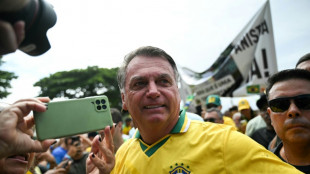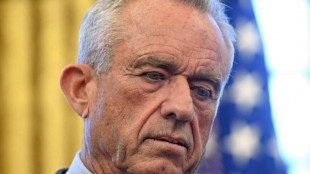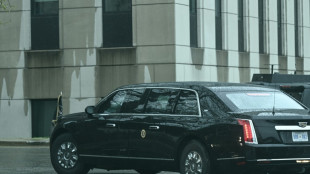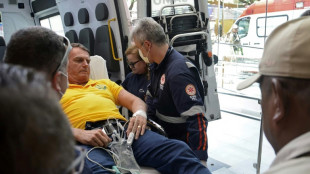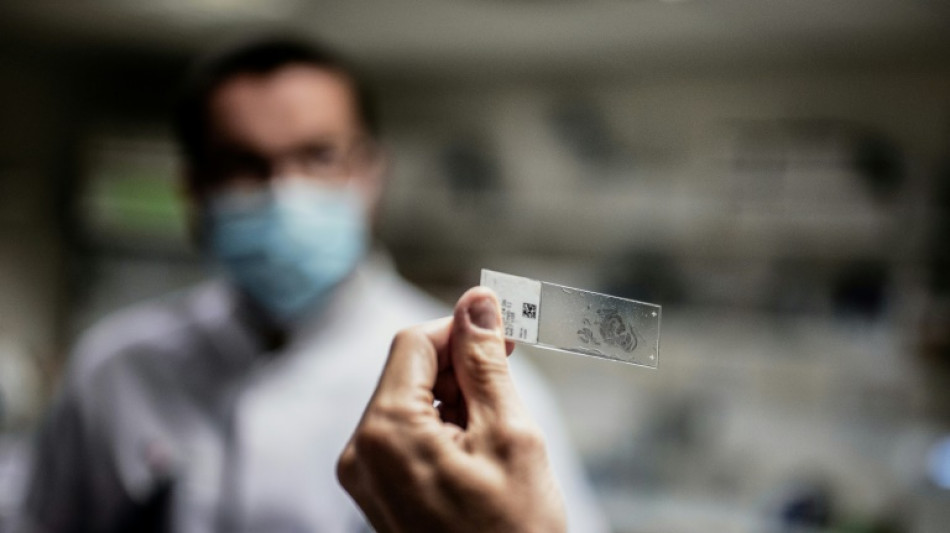
-
 Trump downplays tariffs walk-back, says no country 'off the hook'
Trump downplays tariffs walk-back, says no country 'off the hook'
-
Polls close in Ecuador's razor-tight presidential runoff
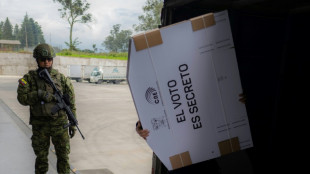
-
 USA, Japan win to qualify for BJK Cup finals
USA, Japan win to qualify for BJK Cup finals
-
Russian missile strike on Ukraine city kills 34
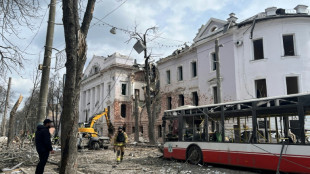
-
 Lyon close in on Champions League, Saint-Etienne snatch draw
Lyon close in on Champions League, Saint-Etienne snatch draw
-
McIlroy leads by four as Masters back-nine battle begins

-
 Lazio and Roma share derby spoils as Atalanta relaunch Champions League bid
Lazio and Roma share derby spoils as Atalanta relaunch Champions League bid
-
Children's show 'Yo Gabba Gabba!' takes Coachella by storm

-
 Fabio Grosso's Sassuolo return to Serie A after a year away
Fabio Grosso's Sassuolo return to Serie A after a year away
-
Red Bull reflect on 'bad' Bahrain weekend

-
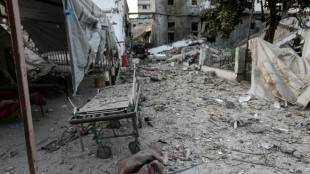 WHO says child killed after Israel strike hits Gaza hospital
WHO says child killed after Israel strike hits Gaza hospital
-
Trump advisor Navarro looks to cool spat with Musk

-
 Moviegoers digging 'Minecraft Movie,' tops in N.America theaters
Moviegoers digging 'Minecraft Movie,' tops in N.America theaters
-
Paris Olympic torches, other memorabilia auctioned off

-
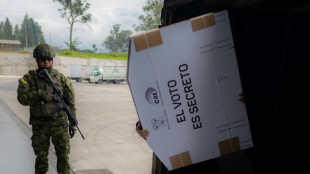 Ecuador votes in razor-tight presidential runoff
Ecuador votes in razor-tight presidential runoff
-
Kohli, Karn star as Bengaluru and Mumbai win in IPL

-
 Amorim has no excuses for Man Utd's latest meltdown
Amorim has no excuses for Man Utd's latest meltdown
-
McIlroy tees off in quest of Masters title and career Grand Slam

-
 Marc Marquez survives brotherly shove to win Qatar MotoGP
Marc Marquez survives brotherly shove to win Qatar MotoGP
-
Mumbai clinch thriller to end Delhi's winning streak

-
 Electric Ekitike keeps Frankfurt on Champions League course
Electric Ekitike keeps Frankfurt on Champions League course
-
'Unusual' errors at fault for latest Spurs defeat, says Postecoglou

-
 'It's up to them': Maresca won't plead for Chelsea fans' backing
'It's up to them': Maresca won't plead for Chelsea fans' backing
-
Liverpool within touching distance of title, Man Utd thrashed by Newcastle

-
 Van der Poel demands action after being hit in face by projectile at Paris-Roubaix
Van der Poel demands action after being hit in face by projectile at Paris-Roubaix
-
Barnes brace routs Man Utd as Newcastle rise to fourth place

-
 McLaren's Piastri powers to 'mega' win in Bahrain
McLaren's Piastri powers to 'mega' win in Bahrain
-
Mbappe sent off as Real Madrid beat Alaves

-
 Last-gasp 'dream' Ramos penalty sends Toulouse into Champions Cup semis
Last-gasp 'dream' Ramos penalty sends Toulouse into Champions Cup semis
-
McLaren's Piastri wins Bahrain Grand Prix

-
 Mbappe sees red as Real Madrid beat Alaves
Mbappe sees red as Real Madrid beat Alaves
-
Last-gasp Ramos penalty sends Toulouse into Champions Cup semis

-
 US says tech tariff exemptions may be short-lived
US says tech tariff exemptions may be short-lived
-
'I love this club' - Van Dijk hints at Liverpool stay

-
 Trump's doctor finds US president in 'excellent health' after physical
Trump's doctor finds US president in 'excellent health' after physical
-
King of the cobbles van der Poel wins third straight Paris-Roubaix

-
 McIlroy aims for Masters win and career Slam but DeChambeau threatens
McIlroy aims for Masters win and career Slam but DeChambeau threatens
-
Liverpool within touching distance of title, Wolves add to Spurs woe

-
 Van Dijk's late winner edges Liverpool towards Premier League title
Van Dijk's late winner edges Liverpool towards Premier League title
-
Alcaraz caps 'difficult week' with first Monte Carlo Masters title

-
 China calls on US to 'completely cancel' reciprocal tariffs
China calls on US to 'completely cancel' reciprocal tariffs
-
Russian strike on city centre of Ukraine's Sumy kills 32
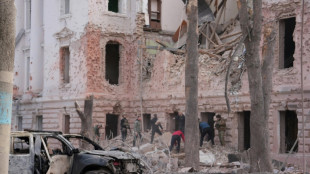
-
 Atalanta beat Bologna to relaunch Champions League bid
Atalanta beat Bologna to relaunch Champions League bid
-
Alcaraz sees off Musetti to win Monte Carlo Masters

-
 Barca's Balde to miss key games with hamstring injury
Barca's Balde to miss key games with hamstring injury
-
Russian strike on Ukraine's Sumy kills 31, including two children
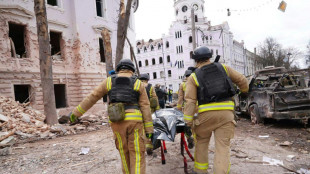
-
 Erased identity: Post-war adoptee seeks German roots
Erased identity: Post-war adoptee seeks German roots
-
Struggling Sevilla sack Garcia Pimienta

-
 Japan qualify for BJK Cup finals with win over Canada
Japan qualify for BJK Cup finals with win over Canada
-
Iran says talks with US to focus solely on nuclear issue, lifting sanctions


The search to discover why 'outliers' survive deadliest cancers
When Herve found out he had glioblastoma -- the most aggressive form of brain cancer -- at the age of 40, he made a deal with himself.
"I said to myself: it is serious, but you are at war -- and you're going to win," the French teacher, who did not want to give his surname, told AFP.
"For my wife and children, I forbade myself to die."
Eight years later, following surgery to remove the tumour, radiotherapy and chemotherapy, Herve is still winning his war.
He is just one of the thousands of people across the world to have survived an extremely deadly cancer for which there is no known cure.
Herve eagerly volunteered for research being conducted by a biotech start-up aiming to find out what makes these exceptional cases different, in the hope of reproducing their unlikely tales of survival on a grand scale.
"We call them outliers," said Nicolas Wolikow, the CEO and co-founder of the Paris-based firm Cure51.
"For unknown reasons, when these people face an illness they take a completely different trajectory from other people," he told AFP.
The start-up is working on creating "the first global clinical and molecular database of exceptional survivors" of cancer, according to its website.
The project will involve patients who lived for more than three or five years after being diagnosed with three of the deadliest cancers: glioblastoma, metastatic pancreatic cancer and small cell lung cancer.
"They are very aggressive cancers for which real new treatments have not been developed over the last 15 years," Wolikow said.
Yet the rare few -- tens of thousands of people worldwide -- still defy what for most would be a death sentence. The question is why.
- Search for 'molecular signature' -
One problem has been that almost all research has been based on North American or Western European patients, Wolikow said.
So the firm has partnered with 50 cancer centres around the world to get data from a wider variety of survivors.
So far, the firm has found 1,300 patients to be part of the project.
Once the data is collected "we will begin analysing medical reports, images, tumour cells," Wolikow said.
The patients will also fill out questionnaires about their lifestyle, sleep, diet and the roles of people around them.
Algorithms deploying artificial intelligence will also be used to seek out the patients' common traits, comparing them to those of people who succumbed to their cancer.
On Wednesday, Cure51 announced it has raised 15 million euros ($16 million) for the project. Eventually, it hopes to be financed through collaborations with other biotech firms or pharmaceutical labs.
Olivia Le Saux, an oncologist in the French city of Lyon who is supervising the project, said the team was hoping to discover a "molecular signature which would explain the exceptional survival of these patients".
The ultimate goal is to create new drugs or treatments that mimic the molecular characteristics of those few who do survive these killer cancers.
For Herve, there was some satisfaction in seeing the surprise on the face of his doctor when his tumour kept failing to return in his regular MRI scans.
"At each appointment I could see the relief on his face," said the teacher in southeastern French department of Isere.
So Herve has happy to volunteer for the Cure51 project.
"I am well aware of having extraordinary luck," he said.
"I told myself that if I wanted to make a contribution, now was the time."
P.Silva--AMWN
